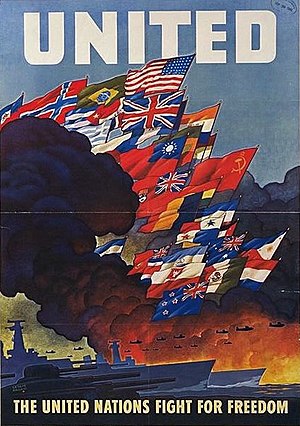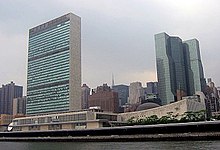New Zealand and the United Nations
[10][11] Former Prime Minister Helen Clark headed the United Nations Development Programme from 2009 to 2017, in which role she was the most senior New Zealander in the UN bureaucracy.
[14] Previous governments had put all their political and military reliance in the "Mother Country" (the United Kingdom), and expressed reservations about particular policies privately.
He feared that the US, USSR, UK and France (China not being a major power of the time) would not accept equal status with smaller countries.
New Zealand served on the United Nations Security Council as a non-permanent member for the Western European and Others Group in 1954–55, 1966[16] and 1993–94.
Successive governments have provided military support in the Middle East, Kashmir, India/Pakistan, Cyprus, Cambodia and Korea.
New Zealand contributed six frigates, several smaller craft and a 1044 strong volunteer force (known as K-FORCE) to the Korean War.
The ships were under the command of a British flag officer and formed part of the U.S. Navy screening force during the Battle of Inchon, performing shore raids and inland bombardment.
In addition to their operations against militia, the New Zealand troops were also involved in construction of roads and schools, water supplies and other infrastructural assistance.
The New Zealand government opposed and officially condemned the 2003 invasion of Iraq by the US-led "Coalition of the Willing" and did not contribute any combat forces.
However, in accordance with United Nations Security Council Resolution 1483 New Zealand contributed a small engineering and support force to assist in post-war reconstruction and provision of humanitarian aid.
The engineers returned home in October, 2004 and New Zealand is still represented in Iraq by liaison and staff officers working with coalition forces.
Promoting economic development was seen as a way of maintaining global peace because it believed that poverty and unemployment was a main factor in social unrest that could lead to uprise or war.
[22] Internationally, New Zealand works closely with Pacific Island partners to support and assist the promotion and protection of human rights to influence positive and real change that makes lasting differences in people's lives.

